| Listing 1 - 6 of 6 |
Sort by
|
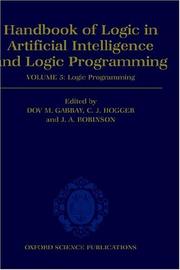
ISBN: 0198537921 9780198537922 Year: 1998 Publisher: Oxford : Clarendon Press,
Abstract | Keywords | Export | Availability | Bookmark
 Loading...
Loading...Choose an application
- Reference Manager
- EndNote
- RefWorks (Direct export to RefWorks)
681.3*I2 --- 681.3*I23 --- 681.3*I23 Deduction and theorem proving: answer/reason extraction; reasoning; resolution; metatheory; mathematical induction; logic programming (Artificial intelligence) --- Deduction and theorem proving: answer/reason extraction; reasoning; resolution; metatheory; mathematical induction; logic programming (Artificial intelligence) --- 681.3*I2 Artificial intelligence. AI --- Artificial intelligence. AI --- Logic Programming --- Artificial intelligence --- Logic, symbolic and mathematical --- Informatique theorique --- Programmation logique
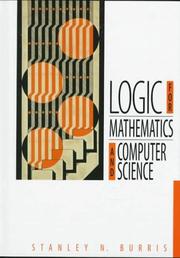
ISBN: 0132859742 9780132859745 Year: 1998 Publisher: Upper Saddle River Prentice Hall/PTR
Abstract | Keywords | Export | Availability | Bookmark
 Loading...
Loading...Choose an application
- Reference Manager
- EndNote
- RefWorks (Direct export to RefWorks)
Computer science --- Logic, Symbolic and mathematical. --- Logique symbolique et mathématique --- Logic, symbolic and mathematical --- 511.3 --- 681.3*F41 --- Analytical, additive and other number-theory problems. Diophantine approximations --- Mathematical logic: computability theory; computational logic; lambda calculus; logic programming; mechanical theorem proving; model theory; proof theory;recursive function theory--See also {681.3*F11}; {681.3*I22}; {681.3*I23} --- 681.3*F41 Mathematical logic: computability theory; computational logic; lambda calculus; logic programming; mechanical theorem proving; model theory; proof theory;recursive function theory--See also {681.3*F11}; {681.3*I22}; {681.3*I23} --- 511.3 Analytical, additive and other number-theory problems. Diophantine approximations --- Logic, Symbolic and mathematical --- Algebra of logic --- Logic, Universal --- Mathematical logic --- Symbolic and mathematical logic --- Symbolic logic --- Mathematics --- Algebra, Abstract --- Metamathematics --- Set theory --- Syllogism

ISBN: 0191916676 1280375280 9786610375288 0191546283 0585483914 9780585483917 9781280375286 019853745X 9780198537458 0198537468 9780198537465 0198537476 9780198537472 0198537913 9780198537915 0198537921 9780198537922 Year: 1998 Publisher: Oxford Oxford New York Clarendon Press Oxford University Press
Abstract | Keywords | Export | Availability | Bookmark
 Loading...
Loading...Choose an application
- Reference Manager
- EndNote
- RefWorks (Direct export to RefWorks)
The Handbook of Logic in Artificial Intelligence and Logic Programming is a multi-volume work covering all major areas of the application of logic to artificial intelligence and logic programming. The authors are chosen on an international basis and are leaders in the fields covered. Volume 5 is the last in this well-regarded series. Logic is now widely recognized as one of the foundational disciplines of computing. It has found applications in virtually all aspects of the subject, from software and hardware engineering to programming languages and artificial intelligence.
Logic programming. --- Computer programming --- 681.3*I2 --- 681.3*I23 --- 681.3*I23 Deduction and theorem proving: answer/reason extraction; reasoning; resolution; metatheory; mathematical induction; logic programming (Artificial intelligence) --- Deduction and theorem proving: answer/reason extraction; reasoning; resolution; metatheory; mathematical induction; logic programming (Artificial intelligence) --- 681.3*I2 Artificial intelligence. AI --- Artificial intelligence. AI --- Logic programming --- Artificial intelligence --- Logic, Symbolic and mathematical --- Algebra of logic --- Logic, Universal --- Mathematical logic --- Symbolic and mathematical logic --- Symbolic logic --- Mathematics --- Algebra, Abstract --- Metamathematics --- Set theory --- Syllogism --- AI (Artificial intelligence) --- Artificial thinking --- Electronic brains --- Intellectronics --- Intelligence, Artificial --- Intelligent machines --- Machine intelligence --- Thinking, Artificial --- Bionics --- Cognitive science --- Digital computer simulation --- Electronic data processing --- Logic machines --- Machine theory --- Self-organizing systems --- Simulation methods --- Fifth generation computers --- Neural computers --- Knowledge, Theory of. --- Théorie de la connaissance. --- Informatique --- Computer science --- Logique mathématique --- Logique non monotone --- Nonmonotonic reasoning --- Artificial intelligence. --- Logic, Symbolic and mathematical. --- Théorie de la connaissance --- Computer science. --- Logique mathématique. --- Logique générale --- Epistemologie --- Logique modale --- Knowledge representation
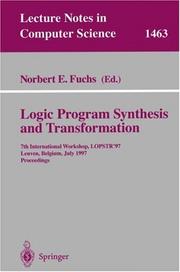
ISBN: 3540650741 3540496742 9783540650744 Year: 1998 Volume: 1463 Publisher: Berlin : Springer,
Abstract | Keywords | Export | Availability | Bookmark
 Loading...
Loading...Choose an application
- Reference Manager
- EndNote
- RefWorks (Direct export to RefWorks)
This volume contains the papers from the Seventh International Workshop on Logic Program Synthesis and Transformation, LOPSTR '97, that took place in Leuven, Belgium, on July 10–12, 1997, 'back to back' with the Fourteenth International Conference on Logic Programming, ICLP '97. Both ICLP and LOPSTR were organised by the K.U. Leuven Department of Computer Science. LOPSTR '97 was sponsored by Compulog Net and by the Flanders Research Network on Declarative Methods in Computer Science. LOPSTR '97 had 39 participants from 13 countries. There were two invited talks by Wolfgang Bibel (Darmstadt) on 'A multi level approach to program synthesis', and by Henning Christiansen (Roskilde) on 'Implicit program synthesis by a reversible metainterpreter'. Extended versions of both talks appear in this volume. There were 19 technical papers accepted for presentation at LOPSTR '97, out of 33 submissions. Of these, 15 appear in extended versions in this volume. Their topics range over the fields of program synthesis, program transformation, program analysis, tabling, metaprogramming, and inductive logic programming.
Logic programming --- Congresses --- Computer Science --- Engineering & Applied Sciences --- -681.3*I23 --- Computer programming --- Deduction and theorem proving: answer/reason extraction; reasoning; resolution; metatheory; mathematical induction; logic programming (Artificial intelligence) --- 681.3*I23 Deduction and theorem proving: answer/reason extraction; reasoning; resolution; metatheory; mathematical induction; logic programming (Artificial intelligence) --- Computer science. --- Computer programming. --- Computer logic. --- Mathematical logic. --- Artificial intelligence. --- Computer Science. --- Programming Techniques. --- Artificial Intelligence (incl. Robotics). --- Logics and Meanings of Programs. --- Mathematical Logic and Formal Languages. --- 681.3*I23 --- AI (Artificial intelligence) --- Artificial thinking --- Electronic brains --- Intellectronics --- Intelligence, Artificial --- Intelligent machines --- Machine intelligence --- Thinking, Artificial --- Bionics --- Cognitive science --- Digital computer simulation --- Electronic data processing --- Logic machines --- Machine theory --- Self-organizing systems --- Simulation methods --- Fifth generation computers --- Neural computers --- Algebra of logic --- Logic, Universal --- Mathematical logic --- Symbolic and mathematical logic --- Symbolic logic --- Mathematics --- Algebra, Abstract --- Metamathematics --- Set theory --- Syllogism --- Computer science logic --- Logic, Symbolic and mathematical --- Computers --- Electronic computer programming --- Electronic digital computers --- Programming (Electronic computers) --- Coding theory --- Informatics --- Science --- Programming --- Logic design. --- Artificial Intelligence. --- Design, Logic --- Design of logic systems --- Digital electronics --- Electronic circuit design --- Logic circuits --- Switching theory --- Logic programming - Congresses
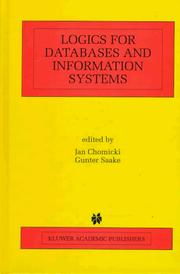
ISBN: 0792381297 1461375827 1461556430 9780792381297 Year: 1998 Volume: SECS 436 Publisher: Boston Kluwer
Abstract | Keywords | Export | Availability | Bookmark
 Loading...
Loading...Choose an application
- Reference Manager
- EndNote
- RefWorks (Direct export to RefWorks)
Time is ubiquitous in information systems. Almost every enterprise faces the problem of its data becoming out of date. However, such data is often valu able, so it should be archived and some means to access it should be provided. Also, some data may be inherently historical, e.g., medical, cadastral, or ju dicial records. Temporal databases provide a uniform and systematic way of dealing with historical data. Many languages have been proposed for tem poral databases, among others temporal logic. Temporal logic combines ab stract, formal semantics with the amenability to efficient implementation. This chapter shows how temporal logic can be used in temporal database applica tions. Rather than presenting new results, we report on recent developments and survey the field in a systematic way using a unified formal framework [GHR94; Ch094]. The handbook [GHR94] is a comprehensive reference on mathematical foundations of temporal logic. In this chapter we study how temporal logic is used as a query and integrity constraint language. Consequently, model-theoretic notions, particularly for mula satisfaction, are of primary interest. Axiomatic systems and proof meth ods for temporal logic [GHR94] have found so far relatively few applications in the context of information systems. Moreover, one needs to bear in mind that for the standard linearly-ordered time domains temporal logic is not re cursively axiomatizable [GHR94]' so recursive axiomatizations are by necessity incomplete.
Computer logic. --- Database management. --- Logique informatique --- Bases de données --- Gestion --- Computer logic --- Database management --- 681.3*F41 --- 681.3*H0 --- Data base management --- Data services (Database management) --- Database management services --- DBMS (Computer science) --- Generalized data management systems --- Services, Database management --- Systems, Database management --- Systems, Generalized database management --- Electronic data processing --- Computer science logic --- Logic, Symbolic and mathematical --- Mathematical logic: computability theory; computational logic; lambda calculus; logic programming; mechanical theorem proving; model theory; proof theory;recursive function theory--See also {681.3*F11}; {681.3*I22}; {681.3*I23} --- Computerwetenschap--?*H0 --- 681.3*F41 Mathematical logic: computability theory; computational logic; lambda calculus; logic programming; mechanical theorem proving; model theory; proof theory;recursive function theory--See also {681.3*F11}; {681.3*I22}; {681.3*I23} --- Bases de données --- Data structures (Computer science). --- Artificial intelligence. --- Programming languages (Electronic computers). --- Information storage and retrieval. --- Data Structures and Information Theory. --- Artificial Intelligence. --- Programming Languages, Compilers, Interpreters. --- Information Storage and Retrieval. --- Computer languages --- Computer program languages --- Computer programming languages --- Machine language --- Languages, Artificial --- AI (Artificial intelligence) --- Artificial thinking --- Electronic brains --- Intellectronics --- Intelligence, Artificial --- Intelligent machines --- Machine intelligence --- Thinking, Artificial --- Bionics --- Cognitive science --- Digital computer simulation --- Logic machines --- Machine theory --- Self-organizing systems --- Simulation methods --- Fifth generation computers --- Neural computers --- Information structures (Computer science) --- Structures, Data (Computer science) --- Structures, Information (Computer science) --- File organization (Computer science) --- Abstract data types (Computer science)
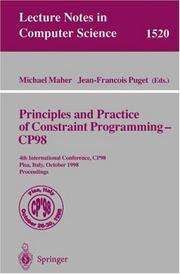
ISBN: 3540652248 3540494812 9783540652243 Year: 1998 Volume: 1520 Publisher: Berlin ; Heidelberg : Springer,
Abstract | Keywords | Export | Availability | Bookmark
 Loading...
Loading...Choose an application
- Reference Manager
- EndNote
- RefWorks (Direct export to RefWorks)
Constraints have emerged as the basis of a representational and computational paradigm that draws from many disciplines and can be brought to bear on many problem domains. This volume contains papers dealing with all aspects of c- puting with constraints. In particular, there are several papers on applications of constraints, re?ecting the practical usefulness of constraint programming. The papers were presented at the 1998 International Conference on Principles and Practice of Constraint Programming (CP’98), held in Pisa, Italy, 26{30 - tober, 1998. It is the fourth in this series of conferences, following conferences in Cassis (France), Cambridge (USA), and Schloss Hagenberg (Austria). We received 115 high quality submissions. In addition, 7 abstracts submissions were not followed by a full paper, hence were not counted as submissions. The program committee selected 29 high quality papers after thorough refereeing by at least 3 experts and further discussion by committee members. We thank the referees and the program committee for the time and e ort spent in reviewing the papers. The program committee invited three speakers: { Joxan Ja ar { Peter Jeavons { Patrick Prosser Their papers are in this volume.
Constraint programming (Computer science) --- Computer Science --- Engineering & Applied Sciences --- Congresses --- -681.3*D1 --- 681.3*I23 --- 681.3*I25 --- Programming techniques--See also {681.3*E} --- Deduction and theorem proving: answer/reason extraction; reasoning; resolution; metatheory; mathematical induction; logic programming (Artificial intelligence) --- Programming languages and software: expert system tools and techniques (Artificial intelligence)--See also {681.3*D32} --- 681.3*I25 Programming languages and software: expert system tools and techniques (Artificial intelligence)--See also {681.3*D32} --- 681.3*I23 Deduction and theorem proving: answer/reason extraction; reasoning; resolution; metatheory; mathematical induction; logic programming (Artificial intelligence) --- 681.3*D1 Programming techniques--See also {681.3*E} --- Computer science. --- Software engineering. --- Computer programming. --- Programming languages (Electronic computers). --- Computer logic. --- Mathematical logic. --- Artificial intelligence. --- Computer Science. --- Software Engineering/Programming and Operating Systems. --- Programming Techniques. --- Programming Languages, Compilers, Interpreters. --- Artificial Intelligence (incl. Robotics). --- Logics and Meanings of Programs. --- Mathematical Logic and Formal Languages. --- 681.3*D1 --- Computer languages --- Computer program languages --- Computer programming languages --- Machine language --- Electronic data processing --- Languages, Artificial --- Computers --- Electronic computer programming --- Electronic digital computers --- Programming (Electronic computers) --- Coding theory --- Computer software engineering --- Engineering --- Informatics --- Science --- AI (Artificial intelligence) --- Artificial thinking --- Electronic brains --- Intellectronics --- Intelligence, Artificial --- Intelligent machines --- Machine intelligence --- Thinking, Artificial --- Bionics --- Cognitive science --- Digital computer simulation --- Logic machines --- Machine theory --- Self-organizing systems --- Simulation methods --- Fifth generation computers --- Neural computers --- Algebra of logic --- Logic, Universal --- Mathematical logic --- Symbolic and mathematical logic --- Symbolic logic --- Mathematics --- Algebra, Abstract --- Metamathematics --- Set theory --- Syllogism --- Computer science logic --- Logic, Symbolic and mathematical --- Programming --- Logic design. --- Artificial Intelligence. --- Design, Logic --- Design of logic systems --- Digital electronics --- Electronic circuit design --- Logic circuits --- Switching theory --- Constraint programming (Computer science) - Congresses
| Listing 1 - 6 of 6 |
Sort by
|

 Search
Search Feedback
Feedback About UniCat
About UniCat  Help
Help News
News